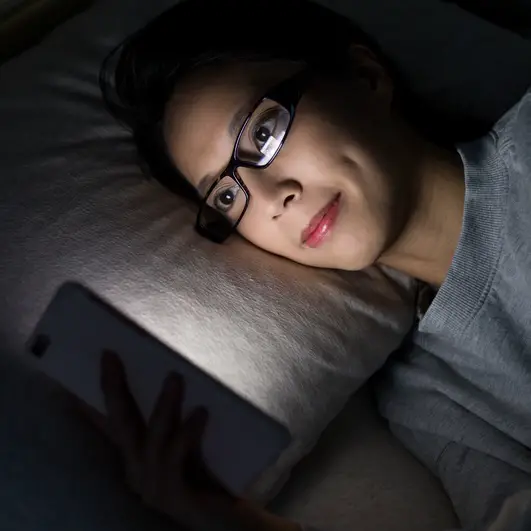In the quest for a good night’s sleep, we often overlook the small habits that can make a big difference. But there’s one bedtime ritual that doctors are increasingly urging patients to abandon – and it might just be the key to unlocking better rest and adding years to your life. Let’s dive into the science behind this sleep-stealing habit and explore how breaking free from it can revolutionize your nights and supercharge your days.
The Blue Light Bandit: How Your Screens Are Stealing Your Sleep

If you’re like most people, you probably wind down your day by scrolling through your phone, catching up on social media, or binge-watching your favorite show. But this seemingly innocent habit could be the very thing sabotaging your sleep. Sleep experts are sounding the alarm on excessive nighttime scrolling and exposure to blue light from electronic devices.
The science is clear: the blue light emitted by our beloved screens interferes with the production of melatonin, the hormone responsible for regulating our sleep-wake cycle. This disruption can make it harder to fall asleep, leaving you tossing and turning when you should be drifting off to dreamland. But the consequences of this habit go far beyond a restless night – they could be shaving years off your life.
The Longevity Link: Sleep Your Way to a Longer Life
A groundbreaking study has revealed the staggering impact of healthy sleep habits on life expectancy. By following five key sleep practices – including falling asleep easily and staying asleep – men could add nearly 5 years to their lives, while women could gain 2.5 years. The numbers are too significant to ignore: those who adhered to all five habits were 30% less likely to die from any cause.
But here’s the kicker: that pre-bed screen time is directly undermining these life-extending sleep habits. By making it harder to fall asleep and stay asleep, your nightly scroll could be robbing you of those precious extra years. It’s time to break up with your phone before bed and reclaim your sleep sanctuary.
The Ripple Effect: How Poor Sleep Impacts Your Health

The consequences of poor sleep go far beyond feeling groggy in the morning. Chronic sleep deprivation has been linked to a host of serious health issues, including:
- Depression
- Increased risk of smoking and substance abuse
- Obesity
- Cardiovascular diseases
- Type 2 diabetes
By continuing to indulge in pre-bed screen time, you’re not just sacrificing a good night’s sleep – you’re potentially setting yourself up for a cascade of health problems down the line. The American Medical Association warns that poor sleep can increase your risk of obesity, heart disease, and type 2 diabetes. It’s clear that the stakes are higher than we might have realized.
Breaking the Habit: Your Roadmap to Better Sleep
Now that we’ve uncovered the bedtime habit doctors want you to stop, it’s time to craft a new, sleep-friendly routine. Here’s your action plan for banishing the blue light and reclaiming your rest:
- Set a digital curfew: Power down all screens at least 2 hours before bedtime. This gives your brain a chance to wind down and start producing melatonin naturally.
- Create a relaxing bedtime ritual: Replace scrolling with calming activities like reading a physical book, listening to soft music, or practicing gentle stretches. Sleep specialists recommend finding a “focused, slow cognitive activity” that signals to your body it’s time to power down.
- Optimize your sleep environment: Transform your bedroom into a sleep oasis. Keep it cool (around 68°F), dark, and quiet. Invest in blackout curtains or a white noise machine if needed.
- Stick to a consistent sleep schedule: Go to bed and wake up at the same time every day – even on weekends. This helps regulate your body’s internal clock.
- Limit caffeine and alcohol: Both can interfere with sleep quality. Cut off caffeine in the afternoon and avoid alcohol close to bedtime.
Remember, breaking a habit takes time and consistency. Be patient with yourself as you work towards better sleep hygiene. The benefits – from improved health to potential years added to your life – are well worth the effort.
The Sleep Revolution: Beyond the Bedroom

Ditching the pre-bed screen time is just the beginning. To truly revolutionize your sleep and reap the longevity benefits, consider these additional sleep-boosting strategies:
- Harness the power of light: Expose yourself to bright, natural light during the day. This helps set your body’s internal clock and improves nighttime sleep quality.
- Move your body: Regular exercise can significantly improve sleep quality. Just be sure to wrap up your workout at least 4 hours before bedtime.
- Mind your diet: Avoid heavy meals close to bedtime, but don’t go to bed hungry either. A light, nutrient-rich snack can help stabilize blood sugar levels through the night.
- Embrace relaxation techniques: Practices like meditation, deep breathing exercises, or gentle yoga can help calm your mind and prepare your body for sleep.
- Address underlying issues: If you’re consistently struggling with sleep, don’t hesitate to speak with a healthcare provider. Conditions like sleep apnea can severely impact sleep quality and overall health.
By implementing these strategies and breaking free from the screen-time trap, you’re not just improving your nightly rest – you’re making a powerful investment in your long-term health and longevity. The research is clear: quality sleep is a cornerstone of overall wellness and disease prevention.
As you embark on this sleep revolution, remember that small changes can lead to big results. Start by putting down your phone an hour earlier tonight. Your future self – well-rested, healthier, and potentially living years longer – will thank you for it. Sweet dreams!

